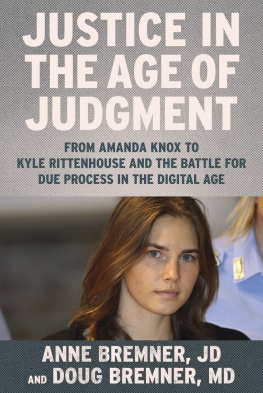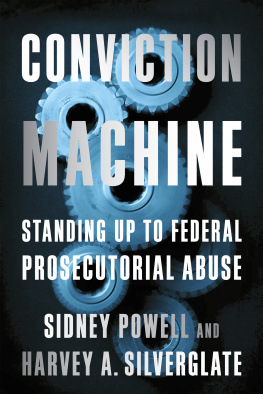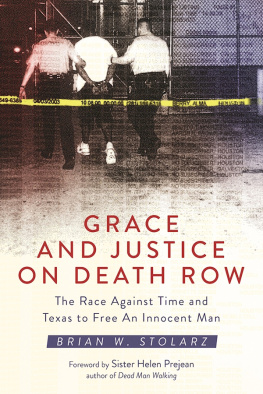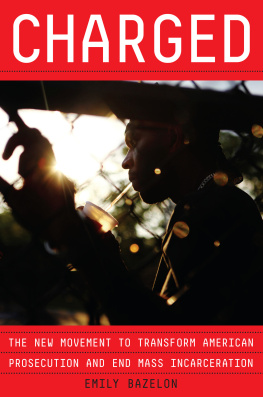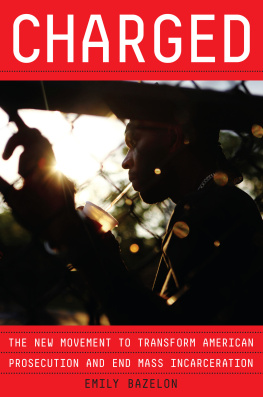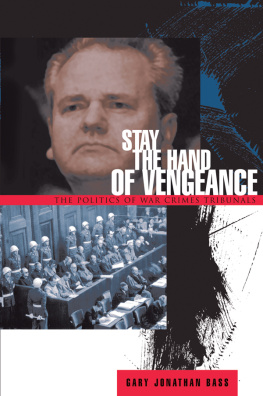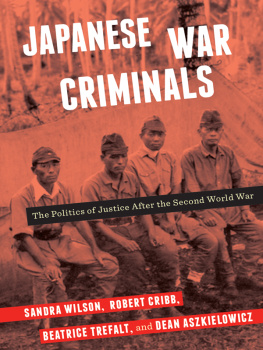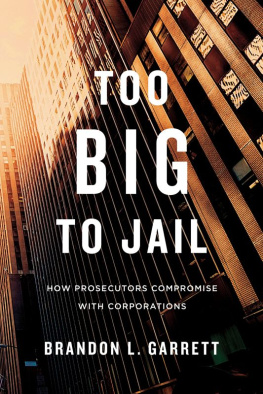Thank you for buying this ebook, published by NYU Press.
Sign up for our e-newsletters to receive information about forthcoming books, special discounts, and more!
Sign Up!
About NYU Press
A publisher of original scholarship since its founding in 1916, New York University Press Produces more than 100 new books each year, with a backlist of 3,000 titles in print. Working across the humanities and social sciences, NYU Press has award-winning lists in sociology, law, cultural and American studies, religion, American history, anthropology, politics, criminology, media and communication, literary studies, and psychology.
Prosecution Complex
Prosecution Complex
Americas Race to Convict and Its Impact on the Innocent
Daniel S. Medwed

NEW YORK UNIVERSITY PRESS
New York and London
www.nyupress.org
2012 by New York University
All rights reserved
References to Internet websites (URLs) were accurate at the time of writing. Neither the author nor New York University Press is responsible for URLs that may have expired or changed since the manuscript was prepared.
Library of Congress Cataloging-in-Publication Data
Medwed, Daniel S.
Prosecution complex : Americas race to convict and its impact on the innocent / Daniel S. Medwed.
p. cm.
Includes bibliographical references and index.
ISBN 9780814796245 (hardback : alk paper)
ISBN 9780814796252 (ebook)
ISBN 9780814764350 (ebook)
1. Prosecutorial misconductUnited States.
2. Judicial errorUnited States. I. Title.
KF9640.M43 2012
345.7305dc23 2011038155
New York University Press books are printed on acid-free paper, and their binding materials are chosen for strength and durability. We strive to use environmentally responsible suppliers and materials to the greatest extent possible in publishing our books.
Manufactured in the United States of America
10 9 8 7 6 5 4 3 2 1
For Howard Medwed who taught me to love the law; Mameve Medwed who taught me to love the written word; and Sharissa Jones, the love of my life.
Contents
2 In the Interest of Full Disclosure:
Discovery in Criminal Cases
PART II. Beyond a Reasonable Doubt?
Reasons to Doubt Prosecutorial Conduct during Trial
6 Closing the Door on Innocence:
Improper Summations by Prosecutors
PART III. The Fallacy of Finality:
Prosecutors and Post-Conviction Claims of Innocence
8 A Closer Look:
Prosecutors and Post-Conviction DNA Testing
Acknowledgments
First and foremost, I thank Sharissa Jones, my beloved wife, dearest friend, and best reader. Our daughter, Mili, deserves credit, too. When asked what her father does for a living, she has taken to telling her preschool pals that Daddy does footnotes.
Other family members and friends played a vital role in my ability to complete this project. My parents, Howard and Mameve Medwed, provided unwavering support, not to mention great feedback on this manuscript; my brother Jono, his wife Marnie Davidoff, and their daughter Mirabelle offered much needed cheerleading throughout the writing process; and my relatives in NebraskaTom, Sharlane, Tod, Bryson, and Tyler Jonestreated me with their characteristic warmth. Special thanks as well to several close friends who have encouraged me for decades: John Haddad, Rich Dubois, Joel Goldberg, and Andy Sheffer. Earlier in my career, I had the good fortune to work on post-conviction innocence cases involving Fernando Bermudez, Bruce Goodman, Stephen Schulz, and David Wong, each of whom graciously permitted me to discuss their sagas in this book.
I am grateful to Hiram Chodosh, my dean at the University of Utah, and Bob Goldberg, director of the Tanner Humanities Center at the University of Utah, for a research leave to serve as a Virgil Aldrich Fellow in the fall of 2010 in order to work exclusively on this book. I also thank my former colleague at Brooklyn Law School, Will Hellerstein, for introducing me to the wonders of post-conviction innocence work and for being such a terrific mentor. Maddy DeLone, Nina Morrison, Peter Neufeld, Barry Scheck, Emily West, and their colleagues at the Innocence Project in New York City provided not only inspiration but also access to information related to several of the cases profiled in the following pages.
This book benefited greatly from a number of academics and attorneys who offered feedback on earlier drafts: Jensie Anderson, Adele Bernhard, Troy Booher, Alafair Burke, Stacy Caplow, Paul Cassell, Susan Courtney, Keith Findley, Leslie Francis, Erika George, Bennett Gershman, Lissa Griffin, Jackie Hodgson, Anders Kaye, Laura Kessler, Erik Luna, Kim Mangun, Wayne McCormack, Nancy McLaughlin, Katie Monroe, Theresa Newman, George Thomas, Debora Threedy, and Ron Wright.
I am deeply in debt to many former students for their help. Jennifer Ku, Chayce Clark, Melanie Stein Grayson, and Razvan Ungureanu devoted countless hours to assist in the research for this project. Also, several students volunteered to read drafts of the manuscript as it approached the copyediting stage: Mike Anderson, Bryan Blackwell, Frank Chiaramonte, Abby Elliott, Veronica McDougal, Natasha Naylor, Barry Stratford, Sam Sutton, and Sheri Throop. Carolynn Westenskows administrative support was invaluable, as were my conversations with Russ Costa about certain aspects of cognitive psychology. Dan Bezdjian and Felicity Murphy helped enormously with the index. And much appreciation to the editorial team at New York University Press, particularly Debbie Gershenowitz for agreeing to publish this book, Rita Bernhard for the excellent copyediting, and Despina Papazoglou Gimbel for shepherding it through to completion.
Parts of this book build upon several of my previously published articles, most notably Anatomy of a Wrongful Conviction: Theoretical Implications and Practical Solutions, 51 Vill. L. Rev. 337 (2006); Bradys Bunch of Flaws, 67 Wash. & Lee L. Rev. 1533 (2010); Closing the Door on Misconduct: Rethinking the Ethical Standards That Govern Summations in Criminal Trials, 38 Hastings Const. L.Q. 915 (2011); Emotionally Charged: The Prosecutorial Charging Decision and the Innocence Revolution, 31 Cardozo L. Rev. 2187 (2010); Innocentrism, 2008 U. Ill. L. Rev. 1549 (2008); The Prosecutor as Minister of Justice: Preaching to the Unconverted from the Post-Conviction Pulpit, 84 Wash. L. Rev. 35 (2009); Up the River without a Procedure: Innocent Prisoners and Newly Discovered Non-DNA Evidence in State Courts, 47 Ariz. L. Rev. 655 (2005); and The Zeal Deal: Prosecutorial Resistance to Post-Conviction Claims of Innocence, 84 B.U. L. Rev. 125 (2004).
Justice Felix Frankfurter once wrote that all systems of law... are administered through men and therefore may occasionally disclose the frailties of men. The same principles apply to law professors. Any errors in this book come from my frailties alone.
Introduction
James Giles served ten years in prison for a vicious rape he did not commit because prosecutors failed to provide the defense with evidence suggesting that a different James Giles was at fault. David Wong endured seventeen years in the penitentiary for a murder he did not commit because prosecutors relied on a dishonest jailhouse informant who received a recommendation for parole in exchange for his testimony against Wong. Bruce Godschalk wasted fifteen years of his life incarcerated for two sexual assaults he did not commit. He spent seven of those years fighting prosecutors just for the chance to subject the biological evidence retrieved from the crime scenes to deoxyribonucleic acid (DNA) testing. These three men are not the only criminal defendants who have suffered the horror of wrongful conviction due to choices prosecutors made in their cases. Why does this happen, and how can it be avoided?
Next page

